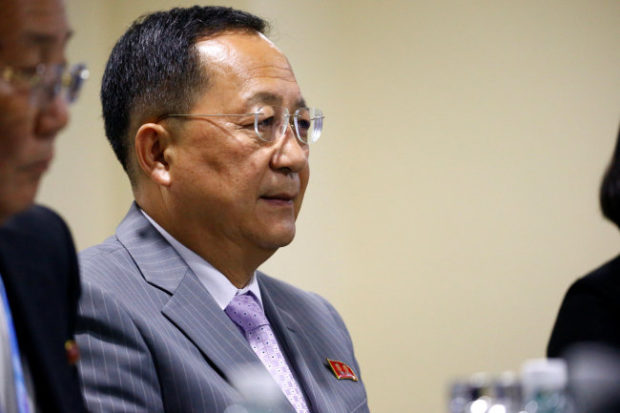Top N. Korea diplomat’s Iran visit sends message to US
SEOUL — North Korean Foreign Minister Ri Yong-ho’s visit to Iran within hours of the US sanctions against the Islamic Republic taking effect raises questions over North Korea’s intentions amid a deadlock in negotiations with Washington over its nuclear weapons program.
By strengthening relations with Iran, which is at odds with the US, Pyongyang is sending a message to Washington that it will not give in to the US pressure campaign, experts noted.
Ri and his Iranian counterpart Javad Zarif met Tuesday, the day the US reimposed economic sanctions on Iran.
US President Donald Trump pulled out of the 2015 nuclear deal — the Joint Comprehensive Plan of Action in May, under which the US and other world powers eased economic sanctions in exchange for curbs on Iran’s nuclear program.
“I think North Korea is seeking to stand united with Iran against the US as they are both facing sanctions from the US,” said Kim Hyun-wook, a professor at the Korea National Diplomatic Academy.
Article continues after this advertisement“As North Korea doesn’t hold many cards in negotiations with the US, it appears to be diversifying its diplomatic partners and strengthening its alliance with them to increase its leverage,” he said.
Article continues after this advertisementRi’s two-day trip to Iran is just the latest example of North Korea’s diplomatic offensive this year. Before traveling to Iran, Ri held bilateral meetings with several Southeast Asian countries on the sidelines of last week’s Asean Regional Forum in Singapore. Ri also visited China, Russia and Cuba earlier this year.
The bilateral meeting with his Iranian counterpart took place at Ri’s request, according to Iran’s state-run Islamic Republic News Agency.
During the meeting, the top diplomats expressed “satisfaction with existing bilateral relations and called for further expansion of ties” and discussed “the latest regional and international developments, as well as issues of mutual interest,” according to the news report.
The countries, which were once both branded as the “axis of evil countries,” may be displaying stronger ties to pressure the US, but it could send a wrong message, another expert said.
“What I am worried about is how the US would see this,” said Park Won-gon, a professor at Handong Global University.
“For the US, nonproliferation of nuclear weapons is one of the pressing tasks and North Korea is already suspected of illicitly spreading nuclear material and technologies to other states or terrorist groups,” he said.
“It could further prompt skepticism within the US and a tougher stance on North Korea.”
North Korea and Iran have maintained positive relations over the past decades. They have been long suspected of cooperating in developing their respective nuclear and missile programs. A UN expert panel in 2010 alleged that North Korea had marketed and exported banned nuclear and ballistic missile technology to certain nations, including Iran, Syria and Myanmar.
Amid a lack of progress on North Korea’s denuclearization and reports of the enforcement of international sanctions on the North being eased, Washington is stepping up pressure on Pyongyang.
“The US has lived up to the Singapore declaration,” White House national security adviser John Bolton said in a Fox News interview Tuesday morning. “It‘s just North Korea that has not taken the steps that we feel are necessary to denuclearize.”
Despite a series of good-will gestures exchanged between the countries, they are believed to have not begun follow-up talks on the North’s pledge to denuclearize and the US’ promise to give a security guarantee to the reclusive country made at their summit in June.
While North Korea demands the US lift the sanctions against it and declare an end to the Korean War, the US demands the North take more concrete steps to denuclearize first.
Ri was reported to have met with President Hassan Rouhani on Wednesday before returning to North Korea.
